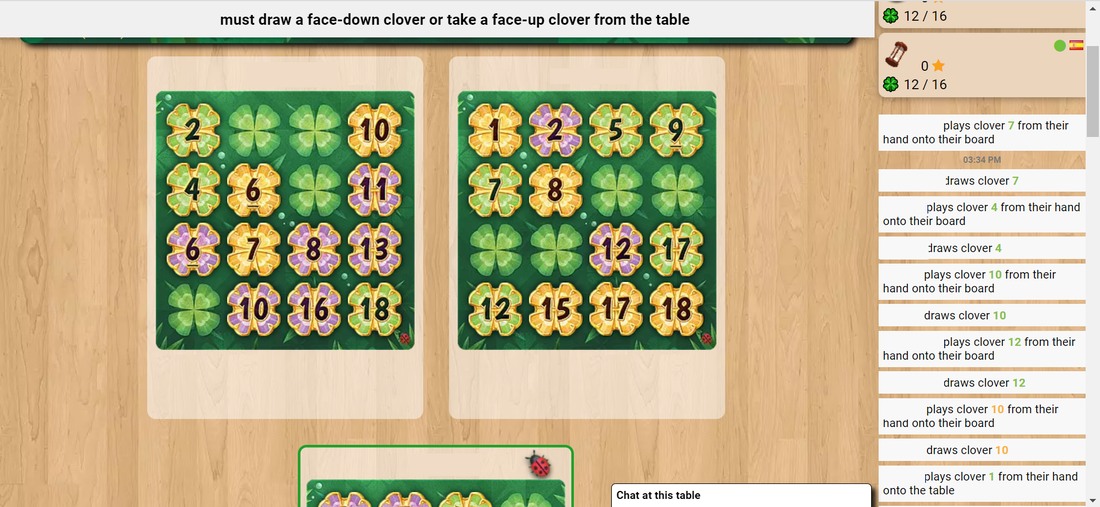|
27th December 2021 Mid-Christmas gaming on Board Game Arena continued with Lucky Numbers. A good Friend Is Like A Four Leaf Clover, hard to find and lucky to have. Well, in Lucky Numbers; clovers make a game easy to learn and fun to play. Caveat: We've only ever played this game digitally. What's in a game?
There's not much to say about the art style, the game looks a little plain but is colourful with a lucky clover theme running throughout. The game's only iconography are the numbers 1-20. How's it play? Setup
On to play The objective in Lucky Numbers is to be the first player to fill in all empty spaces on their board with clover tiles in ascending order. Players take turns acquiring tiles and hopefully placing them on their player boards.
Endgame The first player to place clover tiles on all spaces on their player board, wins! Overall
There's no doubt about it, luck plays an important role in Lucky Numbers, which considering its name is... err... lucky? And that's not a bad thing either. Luck keeps the game fresh, acts as a fairly good balancing mechanic between players of differing experience levels and puts them on their toes. Despite the part that luck plays, there's also strategy to found in Lucky numbers. On a basic level, knowing where to place tiles is critical. After a couple of games players will learn the broad areas that are good placings for a tile but this is also contextual and players will need to pay close attention to the value of the tile in their hand in relation to the tiles already in play on their board. A physical gap between tiles also requires a numerical gap between them, how much of a numerical gap? That depends on those 2 numbers, numbers on nearby tiles, numbers in the central area and even numbers played by other players. Which brings me neatly to other players: There's a slightly deeper level of strategy and gameplay at work here. Players will invariably draw tiles they cannot use and will need to put them in the central area, sometimes though, it will just gift the tile to another player who can find a use for it on their turn. Sometimes it may be prudent to swap if for another tile on the your board to deny it to the other player. Or; if you notice another player swapping out a tile, it probably means they're making a play for something, they may be looking to use the tile they replaced or another tile from the central area in a different space and there may be a way of blocking that play. Even though players are working towards completing their own boards, it really pays to keep an eye on what others are doing and what empty spaces they have on their boards and they're looking for to win. If I had a couple of criticisms, it would be that despite the simple rules, there can be fiddly moments: We've only played the game digitally, but occasionally the game prevents me placing a tile incorrectly (Because I'm not paying attention!). If we were playing a physical, these kinds of mistakes might be missed. Secondly, quite often, if someone is lucky enough to get a good, even spread of 4 starting tiles, it can be too much of an edge, not always but definitely sometimes. None of this is a gamebreaker though. Lucky Numbers nails a sweet spot between replayability, rules-accessibility, randomness and a dollop of strategy. It's a great crossover game that will appeal to non-gamers as strategies utilised in the game are based on cunning and observation, not remembering rules. I wouldn't want to play it too much, but Lucky Numbers is a fun game in short bursts. If you don't mind games where luck can hold a lot of sway, then it's definitely work a look.
0 Comments
Leave a Reply. |
AuthorI play, I paint. Archives
March 2024
Categories
All
|



 RSS Feed
RSS Feed
